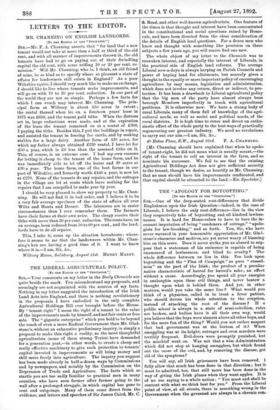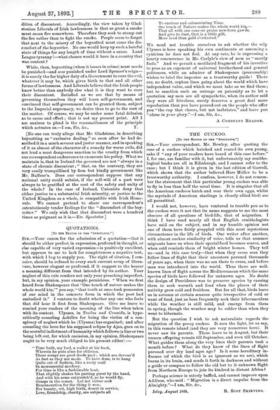THE "APOLOGY FOR BOYCOTTING."
[To THE EDITOR OF THY "SPECTATOR."] SIB,—One of the deep-seated root-differences that divide Englishmen upon the Irish Question—indeed, in the case of Liberals, I believe the only root-difference—lies in the view they respectively take of boycotting and all kindred lawless- nesses. It is hard for Home-rulers to have to bear the in- cessant imputation of being "condoners of outrage," "apolo- gists for law-breaking," and so forth. You, Sir, who have never wavered in your honourable appreciation of Mr. Glag- stone's character and motives, are yet never weary of blaming- him on this score. Does it never strike you as absurd to sup- pose that a statesman of his eminence is capable of being enamoured of lawlessness, and blind to cruelty ? The difference between us lies in this. You look upon boycotting and the "Plan of Campaign" as pure " cussed- ness " on the part of the Irish ; the product of a peculiar native characteristic of hatred for hatred's sake ; an effect without a cause. Accordingly, you spend all your energies in onslaughts upon these evil things, and never bestow a. thought upon what is behind them. And yet, in other matters, would you take the same line ? What would you think of a physician, called in to treat a fever patient, who should devote his whole attention to the eruption, instead of attacking the root of the disease ? If a public school is always in a state of semi-rebellion, rules. are broken, and bullies have it all their own way, would you believe that the boys were sinners above all other boys, and for the mere fun of the thing ? Would you not rather suspect that bad government was at the bottom of it? When- smuggling was at its height, outrages and even murders were terribly frequent. Evil-doers were promptly punished, but the mischief went on. Was not that a wise Administration which did not stop at hanging smugglers, but which found. out the cause of the evil, and, by removing the disease, got rid of the symptoms?
You will say, all Irish grievances have been removed. I fully allow that much has been done in that direction ; but it must be admitted, too, that still more has been done in the way of giving the Irish plums when they want apples. It is of no use saying to a whole nation : "You must and shall be with what we think best for you." From the Liberal point of view, at all events, there is something wrong in the Government when the governed are always in a chronic con- dition of discontent. Accordingly, the view taken by Glad- stonian Liberals of Irish lawlessness is that so great a smoke must mean fire somewhere. Therefore they seek to stamp out the fire rather than to fight the smoke. People seem to forget that next to the misery of the boycotted must come the dis- comfort of the boycotter. No one would keep up such a hateful state of things for any length of time without a cause. Land League tyranny !—what chance would it have in a country that was content ?
While, then, boycotting (when it issues in crime) must needs be punished—and was punished under Lord Spencer's reign— it is surely the far higher duty of a Government to cure the evil, whatever it may be, which gives birth to that and all other forms of lawlessness. And Liberals believe that the Irish people know better than anybody else what it is they want to cure their discontent. Satisfied as we are that by means of governing themselves they will learn self-government, and convinced that self-government can be granted them, subject to the Imperial supremacy, we desire thus to go to the root of the matter. Of course, we may be under some fatal delusion as to cause and effect ; that is not my present point. All I am anxious to plead is the reasonableness of the principle which actuates us.—I am, Sir, &c., Y.
[No one can truly allege that Mr. Gladstone, in describing boycotting as "exclusive dealing" so soon after he had de- scribed it in a much severer and juster manner, and in speaking of it as almost of the character of a remedy for worse evils, did not lend a most dangerous sanction to the cruelty from which our correspondent endeavours to exonerate his policy. What we maintain is, that in Ireland the governed are not " always in a state of chronic discontent ; " that, on the contrary, they are very easily tranquillised by firm but kindly government like Mr. Balfour's. Does our correspondent suppose that any national unity could subsist, if the self-will of a part were always to be gratified at the cost of the safety and unity of the whole ? In the case of Ireland, Unionists deny that either justice to a substantial Irish minority, or justice to the United Kingdom as a whole, is compatible with Irish Home- rule. We cannot pretend to share our correspondent's ostentatiously tender feelings for the "discomfort of the boy- cotter." We only wish that that discomfort were a hundred times as poignant as it is.—ED. Spectator.]



































 Previous page
Previous page